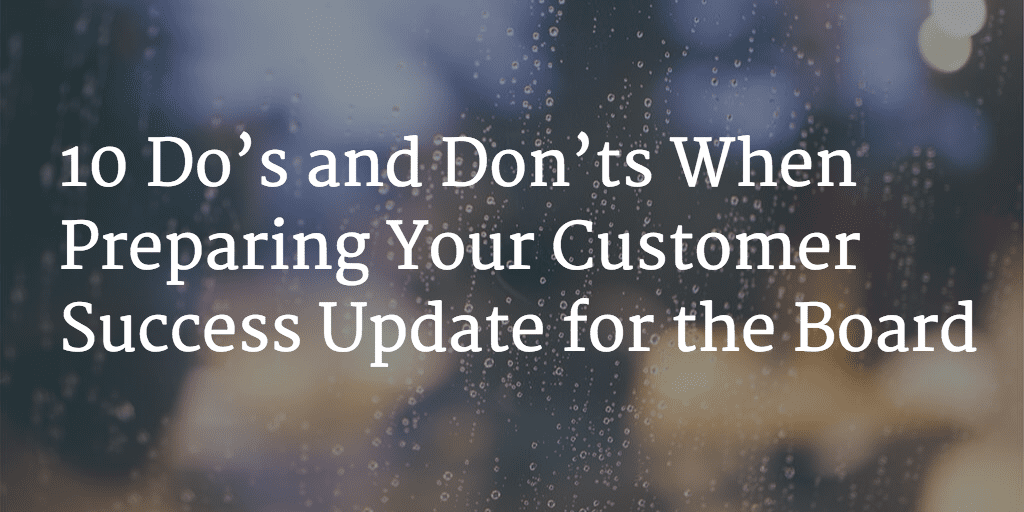Board meetings can be scary and stressful. And your company’s relationship with your board may be very different from mine. In other words, take any, or all, of the suggestions in this post with a grain of salt or at least filter them through what you know about your board.
First off, if you are in the recurring revenue business, your board better want a Customer Success update or you should probably look for a new board. As we all know, the recurring part of that recurring revenue business is equal to, if not greater than, Sales in importance to your long-term success.
With that said, here are a few things to keep in mind.
Do’s
- Be honest: Boards are supposed to operate as partners. Some board meetings may not feel that way, but almost without exception, this really is the way to think about, and deal with, your board. They want success for your company just as much as you do. Don’t try to hide anything from them. Tell it like it is, both positive and negative, and work together on solutions.
- Be consistent: Your board does not think about you or your customers or your company all of the time. You do. Pick a format for your board updates and stick to it so they see the same charts, hear the same terminology, and don’t have to try to figure out what you are telling them every time.
- Be prepared: Of course this goes without saying. But it’s important enough to state the obvious once again. If you are going to board meetings or preparing an update for your board, you are close enough to put yourself in their shoes and consider most of the questions they might ask. Don’t try to prepare slides that answer every possible question, but do whatever you need to do to not be surprised by them.
- Teach: Customer Success is new. Regardless of how smart your board members are, they probably don’t understand your world the way you do. They are equipped to ask great questions about churn and upsell and the basics, but there are things you know about—your customers, the challenges of engagement with your product, and the indicators of at-risk or upsell—that they do not know. Use your opportunities with them to educate them. The more they know, the more they can help.
- Be hard on yourself: Business is hard. Your customers and your processes and your products are not perfect. Don’t pretend that they are. Be hard on yourself when you are reporting how things are going. But, of course, have ideas or programs in place to address the challenges you are having. Just don’t try to sugarcoat the reality. Leave spin to the politicians.
Don’ts
- Be afraid: They may not be your friends, but they are your partners. They want success just as badly as you do and they are almost certainly willing to help in any way they can. Don’t approach a board meeting with fear other than to help you fully prepare. Fear paralyzes and good things never happen when you are paralyzed.
- Be surprised: You should walk out of a board meeting with answers to lots of questions that weren’t asked. Nothing they ask you should surprise you, and if it does, shame on you for not being prepared enough. Review what they discussed with you last time and ask your CEO what he thinks they are likely to ask.
- Go too deep: Preparation is good but don’t go too deep. Remember, this is a once a month or once a quarter endeavor for your board. They care about the broad metrics and the programs you are executing or planning, not the details. If it doesn’t fit nicely in a couple 5-word bullets, it’s probably too deep.
- Be afraid to ask for help: I’ll say it again—your board is in this to help you succeed. And it’s OK if you beat them to it by asking them to help you. Make sure your relationship with your board is a partnership, not that of a teacher-student.
- Surprise your CEO: You don’t want to make your CEO review every one of your slides, but make sure he has a chance to see all of them (even if he chooses not to look) before the meeting. And if there’s anything even remotely controversial or substantively different from the last meeting, point it out to him.
Every board is different and every board meeting is different. And, although I always feel a little trepidation preparing for one and attending one, I always look forward to sharing my challenges (and successes) with other really smart people who want to help me/us succeed. I love my current board. They ask a lot of really smart questions but the thing I love the most is that THE most common question they ask is “How can we help?” That’s nothing short of awesome. I hope you are just as lucky.

